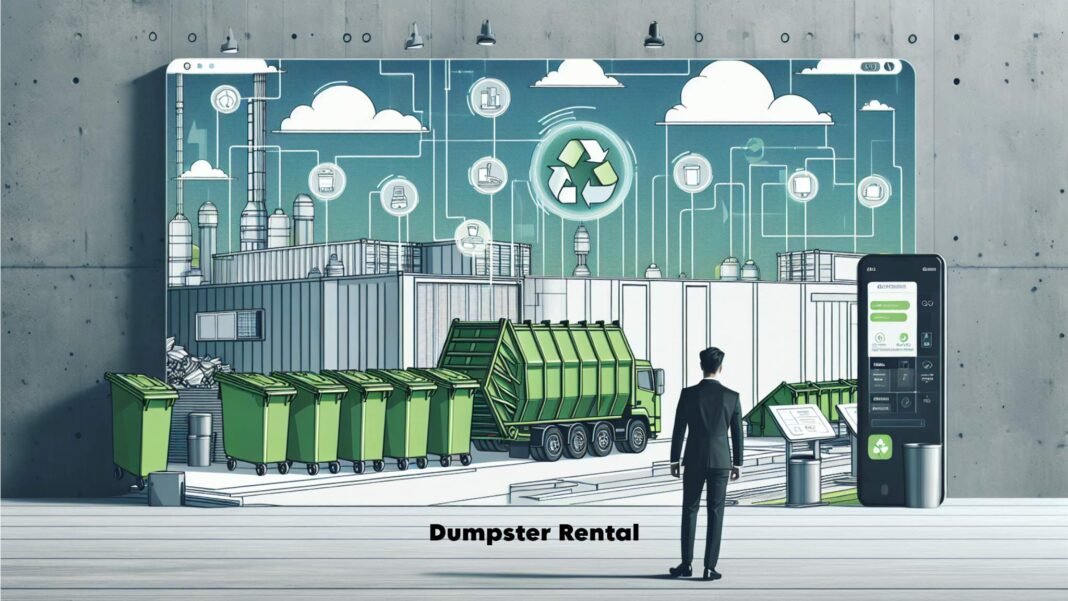Dumpster rental services have become an indispensable tool in managing waste effectively for various projects such as home renovations, construction jobs, and residential cleanouts. Their role in facilitating efficient waste management underscores the importance of choosing the right dumpster rental for one’s specific needs. Such services not only contribute to maintaining cleanliness but also ensure the disposal process complies with regulatory standards, making them a key component in project planning and execution.
Selecting the appropriate dumpster rental involves understanding different sizes available, associated costs, and the regulations governing waste disposal. This article aims to guide readers through the process, providing insights into choosing the right dumpster rental company, preparation before the dumpster’s delivery, and distinguishing between allowable and non-allowable waste items in a dumpster. With a focus on making waste management as convenient as possible, we delve into practical tips and considerations that help streamline the cleanup process for various project scopes.
Understanding Dumpster Rental Sizes
Dumpster rental companies offer a variety of container sizes to suit different project needs, ensuring efficient waste management for both residential and commercial uses. Key to selecting the right dumpster is understanding the dimensions and capacities of each type available.
Roll-Off and Lugger Dumpsters
Roll-off dumpsters, known for their rectangular shape and rolling wheels, are available in sizes ranging from 10 to 40 cubic yards. They are ideal for a broad range of projects, from small home cleanouts to large construction debris removals. Lugger dumpsters, on the other hand, typically have a smaller capacity and are used for less intensive waste removal tasks.
Common Sizes and Uses
- 10-yard dumpsters are perfect for small-scale projects like attic cleanouts or concrete debris removal, costing between $225 to $450 for a week’s rental.
- 20-yard dumpsters are the most popular choice, suitable for medium-sized projects such as roof shingle disposal or large yard cleanups, with rental prices averaging $664.
- 30-yard and 40-yard dumpsters cater to large-scale operations like demolitions or major home renovations, with rentals priced at $778 and $916, respectively.
Choosing the Right Size
It’s often advisable to opt for a dumpster slightly larger than what might initially seem necessary to avoid the inconvenience and additional cost of renting multiple containers. Consulting with a provider like Red Dog Dumpsters can help determine the most suitable size based on the specific scope and type of materials involved in your project.
The Cost of Renting a Dumpster
Understanding the pricing structure of dumpster rentals is crucial for budgeting your waste management needs effectively. Dumpster rental companies, including local businesses and larger entities, offer various pricing models, typically either flat-rate or variable-rate based on weight. It’s essential to consider additional fees that may apply under certain circumstances. Here are some considerations:
Transparent Pricing and Additional Fees
- Flat-Rate Pricing: This model provides a single, all-inclusive price covering delivery, pickup, landfill charges, and a specific weight limit.
- Variable-Rate Pricing: Costs depend on the actual weight of the disposed materials, which might be calculated after the dumpster is filled and collected.
- Additional Fees: Be aware of extra charges that could arise from overloading the dumpster, disposal of prohibited items, delays in pickup, or extending the rental period beyond the agreed term.
Typical Rental Costs and Factors Affecting Prices
- Average Costs: The national average cost for renting a roll-off dumpster is approximately $642 per week, with typical prices ranging from $426 to $857 depending on size and location.
- Local Variations: Prices can vary significantly by region. For example, in the Kansas City area, prices range from $440 to $760.
- Duration of Rental: Most rentals cover a period of 7 to 10 days, with costs increasing for extended rental periods.
Choosing the Right Dumpster Rental Company
Selecting a company with straightforward, transparent pricing without hidden fees is crucial. Companies like First Light Services and Milwaukee Dumpster Rental are known for their clear pricing structures and additional online booking discounts, ensuring no surprises when budgeting for your project. Always review the terms and conditions to avoid unexpected charges, particularly concerning weight limits and prohibited waste types.
How to Choose the Right Dumpster Rental Company
When selecting a dumpster rental company, the initial step is to assess the type of waste your project will generate. Different dumpster rental companies have specific guidelines about what they can handle, so choosing one that aligns with your waste type is crucial. For instance, some may not accept hazardous materials or might have restrictions on construction debris.
Customer service is another pivotal factor. A company that offers clear communication, responsive support, and thorough explanations of their services can significantly enhance your rental experience. It’s beneficial to select a company that is not only knowledgeable but also eager to assist you throughout the rental period. This includes helping you choose the right dumpster size and understanding the terms of service.
Proximity of the dumpster rental company is also essential. Opting for a local provider like First Light Services can offer numerous benefits including quicker delivery times, lower costs due to reduced travel distances, and personalized customer service. Local companies often have a better grasp of regional waste management regulations, which can help in ensuring compliance and avoiding potential legal issues.
Preparation for Dumpster Delivery
To ensure a smooth dumpster delivery process, careful preparation of the delivery site is crucial. Here are some essential steps to prepare for the arrival of your dumpster:
Clear and Mark the Delivery Area
- Space Requirements: Confirm that you have a clear, straight space measuring at least 60 feet in length, 10.5 feet in width, and with a vertical clearance of 25-30 feet.
- Marking the Spot: Use colored tape, 2×8 boards, or cones to mark the exact location where you want the dumpster placed. This aids the delivery driver in placing the dumpster precisely.
Protect Your Property
- Surface Protection: Place plywood under the dumpster area to protect your driveway or any surface from potential damage like scratches or scrapes.
- Obstruction Removal: Ensure that the area is free from cars, debris, and other objects. Double-check this on the delivery day to maintain clear access.
Legal and Logistical Considerations
- Permit Requirements: Check if your locality requires a permit for placing a dumpster, especially if it’s on the street. Apply for this permit well in advance to avoid any legal issues.
- Accessibility for Delivery: Make sure that there are no accessibility barriers such as closed gates or overhead obstructions like tree branches on the scheduled delivery day.
By following these guidelines, you can facilitate a hassle-free delivery and setup of your dumpster, ensuring that your project proceeds without delays.
What You Can and Cannot Dispose of in a Dumpster
When renting a dumpster, it is crucial to be aware of what items are permitted for disposal and those that are restricted. Here is a straightforward guide:
Allowed Items
- Household Junk and Construction Debris: These include materials from home cleanouts and building projects.
- Dry Latex Paint: Ensure it is hardened and sealed within the can.
- Alkaline Batteries and Empty Aerosol Cans: These are generally safe to dispose of in dumpsters.
- Demolition Debris: This encompasses drywall, plywood, brick, concrete, stone, and tiles. Always consider the dumpster’s weight limitations.
- Household Trash: Including wooden furniture and small appliances.
- Yard Waste: Leaves, branches, and sticks are typically permitted.
Prohibited Items
- Hazardous Materials: Such as paints, lacquers, and certain chemicals which pose environmental risks.
- Electronics and Appliances: Items like refrigerators and air conditioners, especially those containing Freon, are not allowed due to their hazardous components.
- Tires and Large Batteries: These require special disposal methods and are not suitable for standard dumpsters.
- Flammable or Toxic Substances: Including fuel, oils, propane tanks, inks, and resins.
It is always best to consult with your dumpster rental company to confirm the specific items allowed in your dumpster, as local regulations may vary. This ensures compliance and avoids potential penalties.
Conclusion
Throughout this exploration of dumpster rental services, we have navigated the essentials ranging from selecting the right size and type of dumpster for your project, understanding the cost implications, to preparing for its delivery and recognizing what items can be safely disposed of within these rentals. Highlighting the significant role that dumpster rental companies play in efficient waste management, this guide has aimed to arm you with the knowledge needed to make informed decisions tailored to your project’s specificities while adhering to environmental and legal standards.
The choice of a dumpster rental should not only reflect a keen awareness of project demands but also an understanding of the broader implications of waste management on community health and safety. As you move forward, remember the critical importance of customer service, proximity, and compliance with local regulations in selecting a rental company. This not only ensures a smooth and efficient cleanup process but also contributes to a more sustainable and responsible approach to waste management. Embracing these practices not only facilitates project execution but also echoes our collective responsibility toward environmental stewardship.
FAQs About Dumpster Rental:
-
What size dumpster do I need for my project?
- The size of the dumpster you need depends on the scope of your project. For small cleanouts or minor remodeling, a 10-yard dumpster might suffice. Medium-sized projects like roof replacements or extensive landscaping may require a 20-yard dumpster. For large renovations or construction projects, consider 30-yard or 40-yard dumpsters.
-
How much does it cost to rent a dumpster?
- The cost of renting a dumpster varies depending on the size of the dumpster, the duration of the rental, and your location. On average, prices can range from $200 to over $800 per week. Most companies offer different pricing models, such as flat-rate (inclusive of delivery, pickup, and landfill charges) and variable-rate (based on the weight of disposed materials).
-
Are there items I cannot throw into a dumpster?
- Yes, there are restrictions on what can be disposed of in a dumpster. Generally, hazardous materials, flammable liquids, tires, batteries, and electronic appliances are prohibited due to environmental and safety regulations. It’s important to check with your rental company for a specific list of non-allowable items.
-
Do I need a permit to place a dumpster on my property?
- If you plan to place the dumpster on a public street or property, you might need a permit from your local city or municipality. However, if the dumpster is on your private property, such as your driveway, you typically do not need a permit. Always verify local regulations before renting a dumpster.
-
How should I prepare for the delivery of the dumpster?
- Ensure there is enough space for the delivery truck to access your site and place the dumpster safely. The area should be clear of any obstacles like vehicles, debris, and low-hanging branches. It’s also advisable to use plywood under the dumpster to protect your driveway or property from damage.


